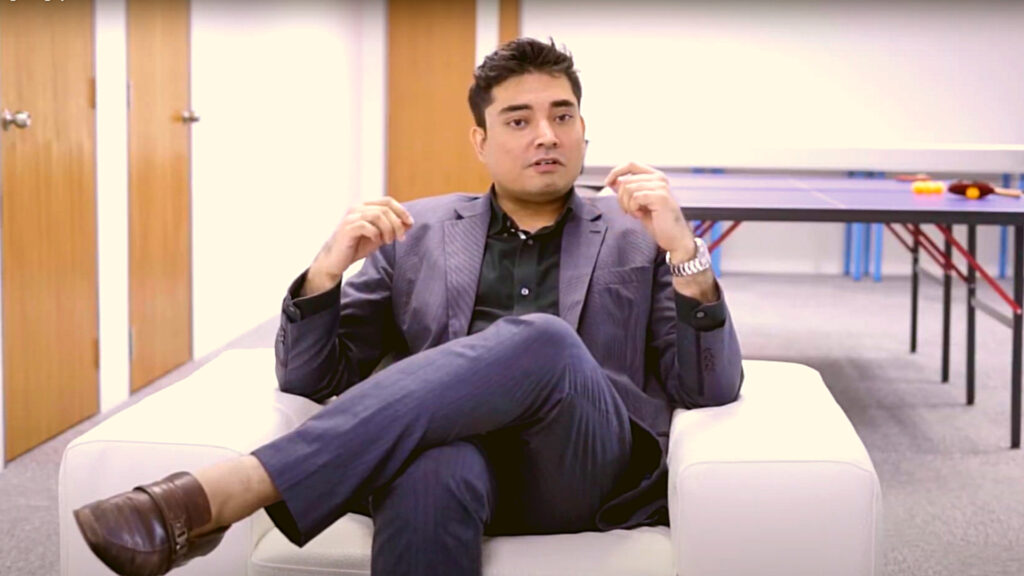Sancy Suraj is a renowned memory athlete and motivational speaker who has achieved world records in memorization. His expertise lies in memory training and motivation, and he has helped many individuals unlock their potential and achieve their goals. In this article, we delve into his knowledge and experience, exploring his tips for memory mastery, motivation, and cognitive development. We also learn how he tailors his speeches and training sessions to different audiences and how he stays up-to-date with the latest research and trends in memory training and cognitive science. Sancy shares personal stories of challenges he has faced and how he overcame them, as well as his future plans and goals for his work as a memory trainer and motivational speaker.

What inspired you to become a memory athlete and memory trainer, and how did you first get started in this field?
I am passionate about helping people unlock their full potential, and I believe that memory training is a powerful tool to achieve that goal. My interest in memory training began when I was in school, where I found myself struggling to remember important information for exams. I realized that I needed to develop better memory skills to succeed academically, so I began studying different memory techniques and strategies.
Over time, I became more and more fascinated by the power of the human mind to retain and recall vast amounts of information. I started experimenting with different memory techniques, such as the method of loci, the peg system, and others and soon discovered that I had a natural talent for memorization. This led me to participate in memory competitions, where I competed against other memory athletes to see who could memorize the most information in the shortest amount of time.
Through my experiences as a memory athlete and trainer, I have come to realize that memory training can be a powerful tool for personal growth and development. By improving our memory skills, we can boost our confidence, enhance our creativity, and achieve greater success in all areas of our lives. As a motivational speaker, I am passionate about sharing these insights with others and helping them unlock their full potential through the power of memory mastery and motivation.
As someone who has achieved world records in memorization, what tips do you have for people who want to improve their memory and cognitive abilities?
I am passionate about helping people unlock their full potential, and I believe that memory training is a powerful tool to achieve that goal. My interest in memory training began when I was in school, where I found myself struggling to remember important information for exams. I realized that I needed to develop better memory skills to succeed academically, so I began studying different memory techniques and strategies.
Over time, I became more and more fascinated by the power of the human mind to retain and recall vast amounts of information. I started experimenting with different memory techniques, such as the method of loci, the peg system, and others and soon discovered that I had a natural talent for memorization. This led me to participate in memory competitions, where I competed against other memory athletes to see who could memorize the most information in the shortest amount of time.
Through my experiences as a memory athlete and trainer, I have come to realize that memory training can be a powerful tool for personal growth and development. By improving our memory skills, we can boost our confidence, enhance our creativity, and achieve greater success in all areas of our lives. As a motivational speaker, I am passionate about sharing these insights with others and helping them unlock their full potential through the power of memory mastery and motivation.
How do you incorporate motivation and inspiration into your memory training, and what techniques do you use to keep people engaged and motivated?
Motivation and inspiration are crucial elements of memory training because they help people stay engaged and committed to the learning process. As a motivational speaker and memory trainer, I use a variety of techniques to keep people motivated and inspired throughout their memory training journey.
One technique that I use is storytelling. By sharing personal stories and anecdotes, I can help people connect emotionally with the material and see how memory training can have a real impact on their lives. I also use humor and interactive exercises to keep people engaged and make the learning process more fun and enjoyable.
Another important technique is goal setting. By helping people set achievable goals and tracking progress towards those goals, I can create a sense of purpose and motivation that keeps people committed to the learning process. Celebrating successes and milestones along the way is also important, as it helps people stay motivated and feel a sense of accomplishment.
I also believe in the power of positive reinforcement. By providing positive feedback and acknowledging people’s progress and achievements, I can help build confidence and self-esteem, which in turn can boost motivation and inspire people to continue learning and growing.
Overall, my approach to memory training is rooted in the belief that everyone has the potential to improve their memory and achieve great things. By using a combination of storytelling, humor, goal setting, and positive reinforcement, I strive to create a learning environment that is engaging, motivating, and inspiring for everyone who participates.
“As a motivational speaker and memory trainer, I believe that inspiration and motivation are essential to achieving success in memory training. By using storytelling, humor, goal setting, and positive reinforcement, I create an engaging and inspiring learning environment that helps people stay committed and achieve their full potential.”
Can you share a specific example of a time when you used your memory skills to overcome a challenge or achieve a goal in your personal or professional life?
Certainly! There have been many times in my personal and professional life when my memory skills have helped me overcome challenges and achieve goals. One example that comes to mind is when I was preparing for a major speaking engagement in front of a large audience.
I knew that in order to give an engaging and memorable speech, I would need to memorize my entire script word for word. This was a daunting task, but I used a variety of memory techniques, such as visualization and association, to help me remember each part of my speech. I also practiced regularly and reviewed my material frequently to ensure that it stayed fresh in my mind.
On the day of the speaking engagement, I felt confident and well-prepared, thanks to my memory skills. I was able to deliver my speech flawlessly and connect with the audience in a meaningful way. Afterward, many people approached me to comment on how impressed they were with my ability to remember such a complex script.
Another example of how I’ve used my memory skills in my professional life is during my work as a memory trainer. I often need to remember the names and faces of hundreds of participants in my training programs. To do this, I use memory techniques such as visualization, association, and repetition to help me remember each person’s name and face.
This has helped me build strong relationships with my clients and create a sense of connection and personalization in my training programs. By remembering people’s names and personal details, I’m able to create a more engaging and effective learning environment.
In my personal life, I’ve also used my memory skills to achieve goals such as learning a new language or memorizing important information for exams. By using memory techniques and practicing regularly, I’ve been able to achieve these goals more quickly and effectively than I would have otherwise.
Overall, my memory skills have been a valuable asset in both my personal and professional life, helping me overcome challenges and achieve my goals. I believe that anyone can benefit from improving their memory skills, and I’m passionate about helping others learn the techniques and strategies that have helped me so much.
As a motivational speaker, how do you use your experience in memory training to help people unlock their potential and achieve their goals?
As a motivational speaker, I firmly believe that unlocking one’s full potential begins with the development of strong memory skills. Memory is the foundation upon which all learning and achievement are built, and by improving their memory skills, people can unlock new levels of productivity, creativity, and success.
In my speeches and training programs, I use my experience in memory training to teach people practical techniques and strategies for improving their memory and cognitive abilities. I show them how to use visualization, association, and repetition to remember important information more effectively, and how to apply these techniques to achieve their goals in all areas of life.
By using real-world examples and relatable anecdotes, I’m able to connect with my audience on a personal level and inspire them to take action toward improving their memory skills. I also emphasize the importance of mindset and motivation, showing people how to develop a growth mindset and overcome mental blocks that may be holding them back from achieving their full potential.
Ultimately, my goal as a motivational speaker is to help people realize that they have the power to achieve anything they set their mind to and that improving their memory skills is the first step towards unlocking that power. By providing practical tools and strategies for memory mastery, I’m able to empower people to take control of their learning and achieve their goals more effectively than ever before.
“Memory skills are the key to unlocking your full potential. By improving your memory, you can achieve new levels of productivity, creativity, and success. As a motivational speaker and memory trainer, I teach practical techniques and strategies for memory mastery that empower people to take control of their learning and achieve their goals with confidence.”
As someone who has achieved world records in memorization, Sancy Suraj shares his tips for individuals who want to improve their memory and cognitive abilities. He emphasizes the importance of a healthy lifestyle and proper nutrition, along with regular practice and consistent use of mnemonic techniques. He also suggests breaking down complex information into manageable chunks, making associations and connections, and visualizing concepts to aid recall.
Sancy incorporates motivation and inspiration into his memory training through his speeches and training sessions. He uses techniques such as storytelling, humor, and audience participation to keep people engaged and motivated. He believes that a positive attitude, self-belief, and goal-setting are key factors in achieving success and unlocking potential.
Sancy shares a personal example of using his memory skills to overcome a challenge in his professional life. He recalls memorizing a 30-page script for a theatrical performance, where he had to remember the exact wording, tone, and inflection. Through dedicated practice and rehearsal, he was able to perform flawlessly, earning him critical acclaim.
Sancy tailors his speeches and training sessions to different types of audiences, ensuring that the message and techniques are relevant and relatable. He conveys key messages such as the power of the mind, the importance of motivation and inspiration, and the benefits of lifelong learning.
Sancy keeps up-to-date with the latest research and trends in memory training and cognitive science through reading and attending conferences and workshops. He emphasizes the role of science in his work, providing evidence-based techniques and insights to his audience.

How do you tailor your speeches and training sessions to different types of audiences, and what are some of the key messages you try to convey?
As a motivational speaker and memory trainer, it’s essential to tailor my speeches and training sessions to different types of audiences. Every audience has unique needs and interests, and it’s important to understand their perspective in order to effectively engage and motivate them.
Before each event, I spend time researching the audience and understanding their demographic, interests, and goals. This allows me to customize my presentation to their specific needs, ensuring that the message resonates with them on a personal level.
During the presentation, I use relatable examples and anecdotes that speak directly to the audience’s experience. This helps to create an emotional connection and makes the information more memorable. I also use interactive techniques such as audience participation and hands-on activities, to ensure that the audience remains engaged throughout the session.
Regardless of the audience, there are some key messages that I try to convey in all of my speeches and training sessions. These messages include the importance of having a growth mindset, the power of visualization and association in improving memory, and the value of consistent practice and repetition. I also emphasize the need to develop a positive attitude and outlook, and the importance of setting achievable goals and taking action toward achieving them.
Overall, my approach to tailoring my speeches and training sessions to different audiences is to listen to their needs and interests and to provide relevant and practical information that speaks directly to their experience. By doing so, I’m able to connect with my audience on a personal level and inspire them to take action toward improving their memory skills and achieving their goals.
In your opinion, what are some of the most important factors that contribute to memory mastery and cognitive development, and how can people cultivate these skills?
From my experience as a memory athlete and trainer, I believe that practice and perseverance are essential factors in memory mastery and cognitive development. Just like with any skill, the more you practice, the better you become at it. This is especially true for memory techniques, which require consistent and deliberate practice to become second nature. Repetition and persistence in practicing memory techniques can help people cultivate and enhance their memory skills.
Another important factor is the use of mnemonic devices, or memory aids, which can help individuals better retain and recall information. Mnemonic devices can take many forms, including visualizations, associations, acronyms, and chunking, among others. By incorporating these techniques into their learning process, people can strengthen their memory and recall abilities.
A healthy lifestyle can also play a significant role in memory mastery and cognitive development. Regular exercise, a balanced diet, and sufficient sleep can help improve brain function and increase cognitive performance. Studies have shown that exercise can enhance cognitive function and even promote the growth of new brain cells, while a diet rich in nutrients such as omega-3 fatty acids, vitamin B12, and antioxidants can support brain health.
In addition, keeping the mind active and engaged is crucial for maintaining cognitive function and memory. Activities such as reading, solving puzzles, learning a new language, or playing an instrument can help stimulate the brain and enhance memory and cognitive abilities.
Overall, memory mastery and cognitive development require a combination of practice, mnemonic devices, healthy lifestyle habits, and mental stimulation. By incorporating these factors into their daily lives, individuals can cultivate and enhance their memory and cognitive abilities and achieve their personal and professional goals.
How do you stay up-to-date on the latest research and trends in memory training and cognitive science, and what role does science play in your work?
Staying up-to-date with the latest research and trends in memory training and cognitive science is crucial for me to continually improve my work as a memory trainer and motivational speaker. I believe that scientific research is the foundation upon which I can develop effective memory training techniques and methodologies. I spend a significant amount of time reading academic journals, attending conferences, and collaborating with researchers in the field to stay up-to-date with the latest developments.
Through my continuous research, I have been able to stay at the forefront of memory training and cognitive science. I have learned about new techniques, insights, and theories that have allowed me to enhance my training and speech delivery. It is important to note that the field of cognitive science is always evolving, and it is important to stay current to ensure that my training is always relevant and up-to-date.
Incorporating scientific research into my training programs and speeches is also important to increase credibility and effectiveness. When I share insights and techniques with my clients or audiences, I always try to explain the scientific rationale behind them. By doing so, they can see the reasoning behind the techniques and feel more confident in applying them in their own lives.
In summary, staying up-to-date with the latest research and trends in memory training and cognitive science is essential for me to continuously improve my work as a memory trainer and motivational speaker. It helps me to develop effective techniques and methodologies, stay at the forefront of the field, and enhance the credibility and effectiveness of my work.
Can you share any personal stories of challenges or setbacks you’ve faced in your work as a memory athlete or motivational speaker, and how you overcame them?
As a memory athlete and motivational speaker, I have faced numerous challenges and setbacks over the years. One of the biggest challenges I faced early on in my memory training journey was figuring out how to overcome the limitations of my own mind. I had to learn how to push past the mental barriers that were holding me back and develop new strategies and techniques for improving my memory and cognitive abilities.
Another major setback I faced was when I suffered a serious injury that prevented me from training and competing for several months. This was a difficult time for me both personally and professionally, as I had to put my career on hold while I recovered. However, I used this time to focus on my mental and emotional well-being and to explore new avenues for personal growth and development.
Despite these challenges, I have always remained committed to my goals and dedicated to helping others achieve their own goals. I believe that setbacks and challenges are an inevitable part of the journey to success and that the key to overcoming them is to stay focused, stay positive, and never give up on your dreams.
One of the most important lessons I have learned in my work as a memory athlete and motivational speaker is the power of resilience and perseverance. No matter what challenges or setbacks we may face in life, there is always a way to overcome them and achieve our goals. It takes hard work, dedication, and a willingness to embrace change and adapt to new circumstances, but with the right mindset and attitude, anything is possible.
What are your future plans and goals for your work as a memory trainer and motivational speaker, and how do you hope to continue making a positive impact on people’s lives?
As a memory trainer and motivational speaker, Sancy Suraj has already made a significant impact on the lives of many individuals around the world. However, he has no plans of slowing down anytime soon. In fact, he has many ambitious plans and goals for his future work.
One of Suraj’s primary goals is to continue to spread the message of the importance of memory mastery and motivation to as many people as possible. He hopes to reach even more individuals in the future through various platforms such as social media, podcasts, and online courses. Suraj also plans to write more books on memory training and motivation, aiming to make his knowledge and expertise accessible to a wider audience.
Another significant goal for Suraj is to continue to push the boundaries of his own memory abilities. He wants to continue breaking world records in memorization and competes in more memory competitions. Suraj believes that continually challenging himself in this way not only helps him to stay sharp and motivated but also serves as an inspiration to others to push themselves to achieve their own goals.
In addition to these personal goals, Suraj also has a broader vision for the impact he wants to make on the world. He hopes to use his platform to encourage more individuals to pursue their passions, embrace challenges, and develop a growth mindset. Ultimately, Suraj wants to inspire individuals to unlock their full potential and live fulfilling lives.
Overall, Sancy Suraj is committed to using his skills and expertise as a memory trainer and motivational speaker to make a positive impact on the world. With his ambitious plans and unwavering dedication, it is clear that Suraj’s influence will continue to grow in the years to come.
“Sancy Suraj’s dedication to spreading the importance of memory mastery and motivation is truly inspiring. His ambitious goals and unwavering commitment to personal growth and pushing boundaries serve as a shining example to others looking to achieve their full potential.”
In conclusion, Sancy Suraj is a remarkable memory athlete and motivational speaker who has helped many individuals unlock their potential and achieve their goals. His tips for memory mastery and cognitive development, combined with his motivational techniques, have made a positive impact on people’s lives. He continues to inspire and educate through his work and remains committed to his future plans and goals for his career.







